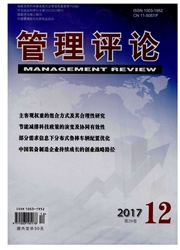

 中文摘要:
中文摘要:
本文以B2C电子商务平台为依托,着重针对商家营销策略对消费者选择商品时所表现出的折中效应的影响进行研究。在对消费者网络购物中选择不同类型商品时是否存在折中效应进行检验的基础上.分类探讨了不同类型营销策略对不同类型商品折中效应的影响。结果显示,消费者在购买便利品或购物品时都表现出折中效应;且价格策略和促销策略都会弱化消费者选择便利品或购物品时所表现出的折中效应;相对购物品,消费者在购买便利品时.两类营销策略对折中效应的影响程度更大;当消费者购买便利品时,与促销策略相比,价格策略会在更大程度上影响折中效应。基于以上分析,B2C商家应加大对便利品销售采取价格策略的频率和力度:提高提示性、比较性信息的可信度。
 英文摘要:
英文摘要:
This paper focuses on the impact of marketing strategy on compromise effect which is shown when the customers choose products on the B2C online shopping platform. After verifying the existence of compromise effect on the B2C online shopping platform, we discuss the impact of different varieties of marketing strategy on compromise effect of different kinds of products. The results show that, the price strategy and sales promotion strategy can both weaken the compromise effect no matter customers choose convenience goods or shopping goods. In addition, the two varieties of marketing strategy play a greater impact on the compromise effect when customers choose convenience goods rather than shopping goods. Besides, price strategy plays a greater impact on the compromise effect than sales promotion strategy when customers choose convenience goods. Finally, we put forward some management suggestions to the B2C online shopping enterprise, including increasing the frequency and strength of price strategy to improve the sale of convenience goods and improving the reliability of advertising information.
 同期刊论文项目
同期刊论文项目
 同项目期刊论文
同项目期刊论文
 期刊信息
期刊信息
